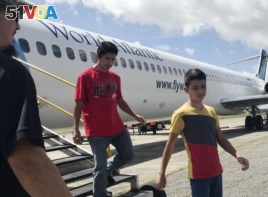16 July, 2018
Donelda Pulex stepped off the airplane into the sun, holding her 5-year-old daughter's hand. She began to cry.
Fourteen-year-old Hermelindo Juarez hid his face as his father held him.
Efildo Daniel Vasquez walked carefully behind his 8-year-old son.
Eleven families that had been detained and separated at the U.S. border returned home to Guatemala. They appeared quiet, unsure and tired.
They flew to Guatemala on a plane rented by the U.S. government. Guatemalan first lady Patricia Marroquin greeted them when the plane landed.
U.S. immigration officials turned the families' paperwork over to the Guatemalan officials. Then, the families walked together into a wide, gray building on the country's military base to be processed back into their home country.
Rented planes full of deportees from the United States often arrive in the Central American country. But this flight was among the first to return families separated at the border under President Donald Trump's zero-tolerance policy.
More than 2,300 children were separated from their families before an executive order ended the separations on June 20.
Although some Central American migrants say they were fleeing their home country to protect their family from violence, the parents who spoke with the Associated Press said they had made the difficult, dangerous crossing to the United States for a better life. They were hoping to get a good job or provide a better education for their children.
They did not know they would be separated from their children under the policy, which criminally charged anyone caught crossing the border illegally. Trump administration officials had said the policy was necessary to put an end to a growing number of illegal border crossings. Trump ended the separations following national and international anger.
The parents who spoke with the AP said they were upset that their difficult journeys had ended in failure. But they also said they were happy to no longer be separated from their children.
Donelda Pulex said she was separated from her daughter for two months as she waited in an El Paso, Texas, detention center.
"It was a great torment," she said, as tears flowed down her face. "I did not know if I would ever see my daughter again. I thought she was taken from me forever." Her young daughter, Marelyn said she talked to her mother by phone from a foster care home in Michigan.
"My mother, she was so sad. She would cry for me, and I would tell her, Mami, everything is OK, I am OK. I will see you soon," Marelyn said. She said the people who cared for her were kind and treated her well, but she missed her mother.
"I am happy to be back with her," she said.
Inside the Guatemalan military base, the families were taken into a hot, crowded room. They were given food and water and told to wait for a medical examination. Then came more paperwork.
Finally, each family was given a bus ticket to return home. Some lived in the mountains more than seven hours away.
About 75 people were aboard the flight. The AP asked at least 24 adults if any of their children were still in the United States because they were deported without them. All said no.
There have been other media reports of parents being deported without their children. Elsa Ortiz Enriquez, who is Guatemalan, said that she was deported last month without her 8-year-old, Anthony David Tovar Ortiz. The boy remained in a center for migrant children in Houston, Texas.
Inside the immigration building, Pulex helped Marelyn drink her water. She then pulled the little girl's hand up to her heart and kissed it.

Fourteen-year-old Hermelindo Juarez, right, and his father, Deivin Juarez, step off a chartered flight from the U.S., Tuesday, July 10, 2018 in Guatemala City, Guatemala, after the two were deported.
And Hermelindo Juarez told his father, Deivin Juarez, that he felt very tired. The two made the trip to the U.S. border in early May. They had spent two weeks getting there, with very little food.
"We were starving," Juarez said.
Hermelindo said he did not know where he was going when he was separated from his father. He also said he and his father were not able to communicate with each other easily during their time apart. The boy was sent to a center in Tucson, Arizona. He said he was treated well there; he studied and played soccer.
"I felt comfortable there," he said. There were children there from Brazil, from India and Guatemala, he said. He did not know how many had been separated from parents or how many had entered the United States alone.
More than 10,000 children who crossed the border alone are in U.S. government care.
Deivin Juarez and some other parents said they had paid thousands of dollars to smugglers. They said they would not likely try the journey again anytime soon.
I'm Susan Shand.
The Associated Press reported this story. Susan Shand adapted the story for VOA Learning English. Ashley Thompson was the editor.
______________________________________________________________
Words in This Story
deportee – n. someone who is forced to leave a country because he is not a citizen
zero-tolerance – adj. unwilling to accept any dissent
prosecute – v. to hold a trial against a person who is accused of a crime to see if that person is guilty
torment – n. to cause someone to feel extreme physical or mental pain
foster – adj. used to describe a situation in which for a period of time a child lives with and is cared for by people who are not the child's parents
screening – n. an examination from a medical professional
smuggler – n. to move someone or something from one country into another illegally and secretly